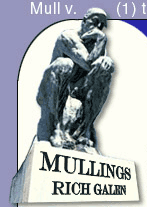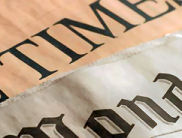

The Rules, They Are a'Changin'
Wednesday June 20, 2007
Click here for an Easy Print Version
Don't forget to check out 
New Every Friday!
Got a question? Get an answer. Send an e-mail to
Dear Mr. Mullings
This all started a couple of weeks ago when I pointed out that the New York Times had practiced "editorializing by placement" by puttting the story about the plot to blow up JFK Airport "on page THIRTY, the page after the obituaries and the page before the chess column." (Mullings, "First Secure Your Base", June 4, 2007.)
A reader sent that along to the editorial page editor of the "Redding Record Searchlight" in Redding California, a guy named Bruce Ross.
Ross has a blog in which, on June 8, he wrote:
"Rich Galen has strong opinion[s] about newspapers but doesn't seem to know much about them. The Sunday NY Times -- at least the national edition -- is finished way early Saturday so it can be printed and distributed around the country (even in little ol' Redding, California). That makes it a poor source for breaking news. I'd bet $100 that it was on the front of the Times' local edition for Sunday."
Yeah, well, the Washington edition of the Sunday NY Times is published in Springfield, Virginia and often contains the previous night's sports scores. And, the story was not on the front [page] of the Times' NYC edition.
On his blog of June 10, Ross wrote this:
I stand corrected. Here I'm reading my Sunday Times this morning, and I stumble across the new "public editor's" column, which is about why the editors chose not to play the JFK plot on the front page.
The "Public Editor" thought the placement issue was so important he moved up the official start of his ombudsman column to cover it.
I wrote an e-mail to Mr. Ross (and to his bosses) asking if that kind of non-reporting (about the Sunday Times being put to bed on Saturday and my not knowing squatsola about newspapers and all) would have made the print edition of his newspaper or whether the rules on standards of accuracy are significantly lower for the web-based editions.
I am waiting, still, for an answer. I am also waiting for my $100.
New Feature!
Check out the new Mullings Blog.
An irregular, irreverent, and often irrelevent look at what I'm thinking about at any given moment!
The other day the campaign of Barak Obama sent out a memo detailing the Clintons' connections to India, referring to her as "Hillary Clinton (D-Punjab)" which, so you don't have to look it up, is in the far northwest corner of India on the border with Pakistan.
In his reporting on Obama's non-apology for the racial slur, the AP's Mike Glover wrote that "Obama's campaign sent the memo to reporters, demanding that it not be attributed to their campaign," which struck me as passing strange.
When did the rules change such that a campaign could "demand" a shot fired across the bow of an opponent be not-for-attribution?
Unlike that character in Redding, I called and/or e-mailed four reporters and two campaigns to find out what was what.
Turns out that there are informal blanket agreements for what are known as "quotes and votes" e-mails that reporters can use as a jumping off point for a story. The reporters said they would never use the material without checking the citations for themselves, but they all work for major news organizations.
I am not all certain that a reporter for a newspaper like - let's just pick one at random out of the hat here - Oh! What a coincidence! The "Redding Record Searchlight" would be as persnickety about making certain the citation was (a) true and/or (b) in context before running with it - at least on the editorial page editor's blog.
Under the heading: "Be careful where you send your not-for-attribution stuff," according to the NY Times:
The Obama campaign was forced to acknowledge authorship when the Clinton campaign got a copy and shared it with The New York Times.
It seems to me that a reader has the right to know that Campaign A, is sending Reporter B, information seeking to do damage to Campaign C which then appears in print (or, in the case of the "Redding Record Searchlight" �).
In that way a reader can decide how much, if any, weight should be placed on the information and can also draw some conclusions as to why Campaign A might have chosen that specific material to send about Campaign C at that particular moment.
The rules appear to be changing, and not for the better.
I still want my hundred bucks.
On a the Secret Decoder Ring page today: Links to the official website of Punjab (wait'll you see it), the AP piece by Mike Glover and the NY Times coverage. Also a Mullfoto of another satisfied voter and a Catchy Caption of the Day.
ALSO Dear Mr. Mullings. New Every Friday!
--END --
Copyright © 2007 Barrington Worldwide, LLC
Become a
Paid Mullings Subscriber!
(To join the FREE mailing list or to unsubscribe Click Here)

Current Issue |
Secret Decoder
Ring | Past
Issues | Email
Rich | Rich
Who?
Copyright �2006 Richard
A. Galen | Site design by Campaign
Solutions. |





 US & Int'l Papers
US & Int'l Papers
